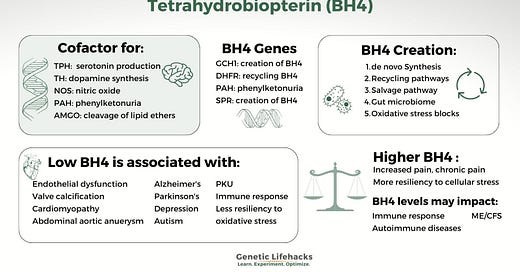BH4, Tetrahydrobiopterin
Essential for neurotransmitters, heart health, resilience to oxidative stress, and more
Hi there,
I mentioned last week that I was working on a deep dive article on Tetrahydrobiopterin (BH4).
It turned out to be a fascinating topic, at least to me, that is fundamental to many aspects of long-term health and wellness.
BH4 is a cofactor needed for the production of neurotransmitters and nitric oxide. It is also essential for phenylalanine metabolism and a cofactor in ether lipid metabolism.
This means that BH4 is essential for heart health, vascular function, brain function, immune response, resiliency to oxidative stress, and pain levels.
Similar to key genes such as MTHFR, variants in the BH4 production pathway can impact many different aspects of wellness, resilience, and healthy aging.
For example, genetic variants in a key BH4 production gene can limit BH4 production during times of cellular stress. These variants are associated with an increased risk of endothelial dysfunction and heart problems due to alterations in endothelial nitric oxide production. On the plus side, these same variants are protective against chronic pain.
It's a long article, but I think the topic will be of interest to anyone who wants to optimize vascular health and cognitive function as we age.
With gratitude,
Debbie
In case you missed this announcement:
For my non-member newsletter readers, most of the genotype reports are now going to be viewable only for logged-in members. This decision was made, in part, to cut down on the AI bots that are scraping my site and taking my content.
New articles will remain open for non-members to read for the first week they are published.
So... read the article on BH4⇩ this week.
BH4: Tetrahydrobiopterin Synthesis, Recycling, and Genetic SNPs
Key takeaways:
~ BH4 is an essential cofactor needed for the production of neurotransmitters, nitric oxide, and more.
~ Your BH4 levels are important for heart health, immune response, and cognitive disorders.
~ Genetic variants affect how likely you are to have low BH4 during times of oxidative stress or inflammation.
~ There are natural ways to improve low BH4 levels, as well as safety considerations.
What I've been reading:
1. Lifelong endurance exercise and its relation with coronary atherosclerosis
This study on lifelong endurance athletes caught my eye for its surprising (to me) findings. The research involved lifelong master endurance athletes, people who more recently started athletics, and health non-athletes. All were male with low cardiovascular risk profiles. The results: "Lifelong endurance athletes had more coronary plaques, including more non-calcified plaques in proximal segments, than fit and healthy individuals with a similarly low cardiovascular risk profile." Looking at the numbers, the lifelong athletes were almost twice as likely to have plaque as the healthy non-athletes.
2. Trial of the MIND Diet for Prevention of Cognitive Decline in Older Persons
This much-anticipated study on Mediterranean-DASH diet intervention for preventing cognitive decline didn't have the positive results that many were anticipating. It was a three-year-long diet trial in older people who were healthy but had a family history of dementia. Half of the group (~300) went on a healthy Mediterranean-style diet emphasizing green leafy vegetables and berries. The other half ate their regular diet. Both groups were encouraged to try to consume a little less food (250kcal/day less). The results after three years showed no differences in cognition or in brain MRI outcomes. The healthier, brain-food diet didn't impact cognition scores.





